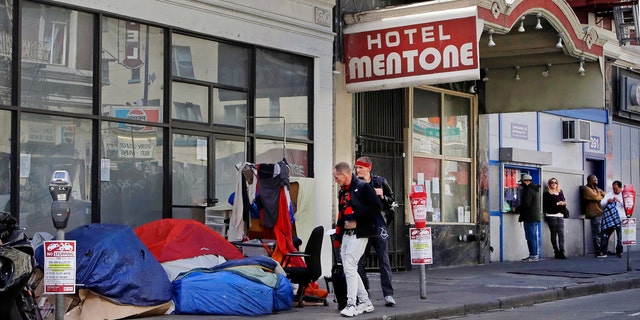San Francisco is being sued by a law school and residents and businesses in the inner-city Tenderloin District who argue sidewalks are “unsanitary, unsafe, and often impassable" as homeless people crowd streets amid the coronavirus pandemic.
The number of tents and makeshift structures in the Tenderloin has tripled since January, as homeless shelters are forced to operate at low capacity in order to enforce stringent social distancing requirements, reports say.
The federal lawsuit, filed last week in part by the University of California Hastings College of Law, does not seek financial damages but instead demands the city clean up streets littered with drug needles and human waste. The litigants are also seeking help for people living in sidewalk tents, saying they are at increased risk of COVID-19.

In this Monday, April 13, 2020, file photo, pedestrians walk to the edge of the sidewalk to avoid stepping on people in tents and sleeping bags in the Tenderloin area of San Francisco. (AP Photo/Ben Margot, File)
“We are suing because our neighborhood has become a pandemic containment zone,” David Faigman, chancellor and dean at UC Hastings, who is heading the case in federal court, told CNN. "The city has basically cordoned off our area. Tents are blocking the streets. Tents are blocking doorways. There are needles in the streets. There’s open-air drug dealing."
The Tenderloin is home to more children per capita than any other neighborhood in San Francisco, as well as elderly and vulnerable populations.
Faigman argues those populations are not being protected, adding that no public COVID-19 testing is being conducted in the district, leaving residents fearful the “virus is raging in the neighborhood.”
About 400 tents currently occupy the neighborhood, according to The Associated Press.
“There’s no other neighborhood in San Francisco that would tolerate that, and they would stand up and be counted. Tenderloin needs to stand up and be counted,” Faigman said.
Mayor London Breed rolled out a plan Wednesday that involves ushering people experiencing homelessness to sanctioned “safe-sleeping” encampments and enforcing rules requiring sidewalk tents to be at least six feet apart. Other measures will close off some streets and parking, add wash stations and restrooms, as well as increase health services and access to food, the San Francisco Chronicle reported.
“I think the plan is entirely inadequate. It essentially institutionalizes the status quo. It simply keeps everybody in place. It is a Band-Aid when a bandage is needed,” Faigman said. “It was thrown together in response because they knew the lawsuit was coming, but it clearly does not provide a real solution."
Pointing out that the plan fails to address open-air drug dealing, Faigman said San Francisco has otherwise taken a “hands-off” approach in tackling its homelessness crisis and should, therefore, welcome federal oversight as a “way to break through political barriers and accomplish what they want to accomplish as well, which is to clear the streets and protect the people of San Francisco.”
Randy Shaw, director of the Tenderloin Housing Clinic, said he’s troubled by what’s been allowed to flourish during the pandemic. While Breed closed off part of Golden Gate Park to traffic so people could safely exercise, there’s no such elbow room in the Tenderloin.
“I don’t know of any place in America where health mandates are so flagrantly violated as in the Tenderloin,” he told the AP. “It hasn’t sunk in that we’re in danger.”
Breed has faced criticism for ignoring an emergency legislative order from city lawmakers requiring her to acquire enough hotel rooms for all of the city’s estimated 8,000 homeless people.
Activists, some of whom staged a “die-in” outside the mayor’s home, questioned why Breed would pass up the chance to get people into hotels, especially since the Federal Emergency Management Agency would foot 75 percent of the cost.
“I get that everyone wants to see something different,” Breed said. “I want to see something different, but we’re not housekeepers, we’re not babysitters, and we’re being treated that way by people who have some challenges in some cases, and some difficulties and some who are just downright defiant.”
The mayor argued that outreach workers are faced with difficulties in accommodating many of the homeless who have mental health and addiction issues.
Nearly eight weeks after the shutdown order, more than 1,000 homeless people have been moved into hotel rooms in the city, which Breed calls a remarkable accomplishment despite “an incredible logistical challenge.”
About 1,700 hotel rooms remain empty, though, as the rooms are prioritized for front-line workers, homeless people recovering from COVID-19, or those who are older or have underlying health problems. Meanwhile, shelters have stopped admitting people because of spacing requirements, and the city’s largest shelter was shut down after 106 people became infected with the virus.

No comments:
Post a Comment